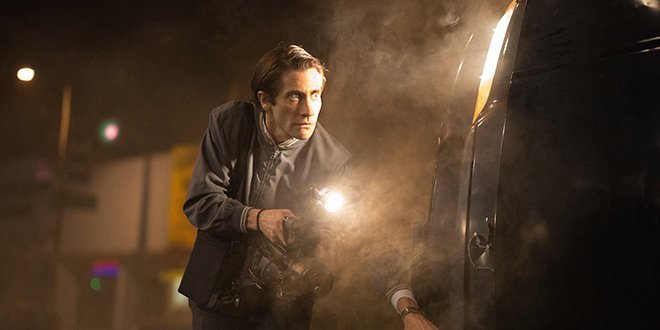When we first meet Louis Bloom (Jake Gyllenhaal), he’s cutting sections of chain-link fence from a construction site to sell for scrap. It’s not exactly the ideal way to make a living, and Bloom certainly aspires to greater things – he even lobbies unsuccessfully for a job at the scrapyard, but the manager isn’t keen on hiring thieves. But while driving home, Bloom comes across an auto accident, with emergency personnel working frantically to free a woman trapped in the wreckage while the entire scene is being filmed by an independent cameraman (Bill Paxton) hoping to sell the footage to a local news station.
Something about this profession strikes a chord with Louis, and it doesn’t take long before he’s armed himself with a shoddy police scanner and a cheap camcorder, trying to get his feet wet in his newly adopted vocation. Louis quickly learns that the veterans don’t take kindly to newcomers, and they’re not about to share any tricks of the trade, but Louis’s lack of experience is more than balanced out by his cunning and ingenuity. In one early scene, as late night news director Nina (Rene Russo) tells him that she already has footage from the same incident he recorded, Louis smiles warmly and informs her that he was closer to the subject, with a better angle – but he’s not trying to bargain with her, he’s just merely passing along information, with just the right amount of aloofness to pique her interest.
With her station struggling desperately for ratings, Nina strikes up a deal with Louis, giving her first option on whatever footage he captures from his late-night escapades. The relationship bears fruit quickly, with the station boasting a steady string of high-rated scoops, and Louis trading in his beat-up hatchback and low-grade equipment for a Dodge Charger and a GPS-enabled police scanner complete with a touchscreen interface. He also acquires the services of Rick, a homeless “intern” that assists with navigation and operating the second camera in exchange for a paltry thirty bucks per night, and Louis’s constant promises of developing his skills to further his “career.”
As Louis continues to outrun and outsmart his fellow nightcrawlers, he comes obsessed with recognition, and the power that comes from it. He demands that the name of his “news company” be read by the morning anchors anytime his footage is shown, he insists that he be introduced to the TV station executives and credited with Nina’s ongoing success, and he subtly threatens to offer his footage to rival news outlets unless Nina yields to his romantic advances. And he does all of these things, and plenty more, with a frighteningly genial disposition, his face always lit up with a cheerful grin.
While roles in Enemy and Prisoners afforded Gyllenhaal the opportunity to play characters that inhabit some dark spaces, there’s something even more compelling about watching him disappear into the mind of a complete sociopath. No matter what deplorable and horrific action Louis takes over the course of Nightcrawler‘s two-hour running time, he never shows the slightest hint of guilt or remorse, remaining singularly focused on achieving his goals at any cost. Combined with Gyllenhaal’s dramatic physical change – he lost over 20 pounds for the role, with his hollowed eyes and gaunt appearance adding to the creepiness – it’s a fascinating performance, and among the actor’s best work to date.
Undeniably disturbing and unapologetically cynical, Nightcrawler is also an acerbic derision of what passes for “journalism” in today’s society, where actually reporting the news has become far less important than providing ghastly imagery for the public to devour en masse. One of the film’s best sequences plays with this very idea, as the stomach-churning choices that Louis makes after arriving at the scene of a home invasion are justified when Nina agrees to the exorbitant price he places on the footage. The exchange borders on outrageous, and yet we can’t help but wonder how authentic it might be. After all, as Paxton’s character says wisely, “If it bleeds, it leads.”




